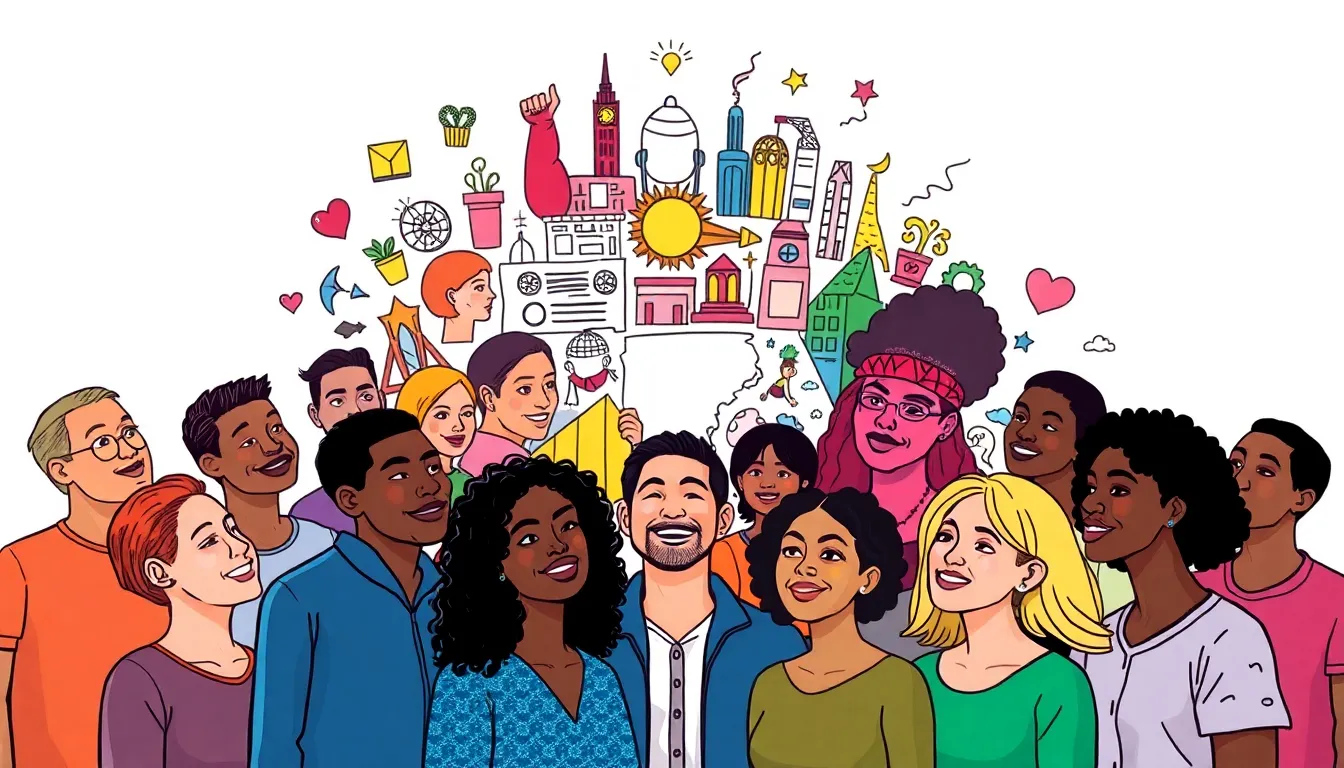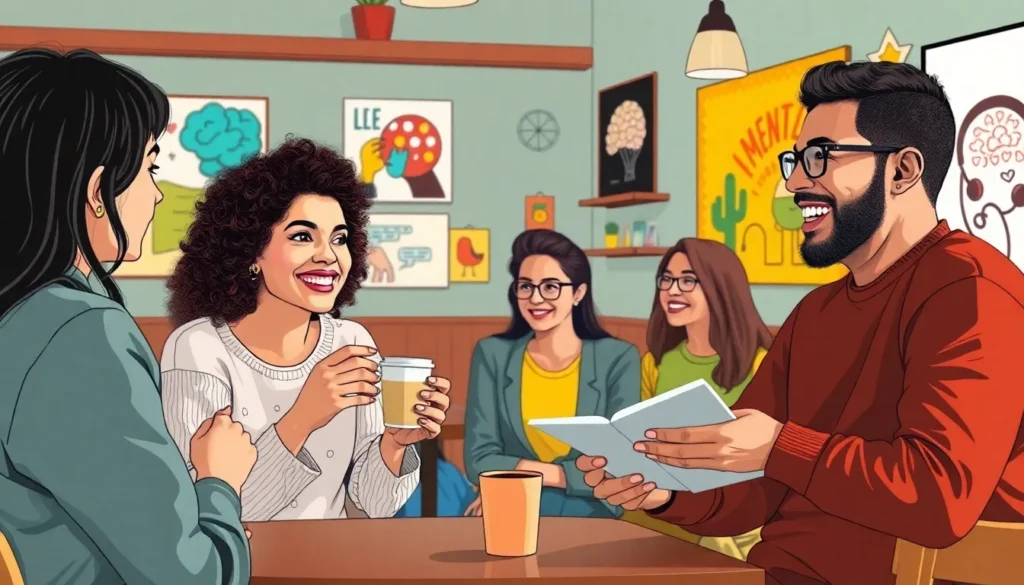In a world where memes rule the internet and cat videos reign supreme, it’s easy to overlook the importance of mental health. But let’s face it: mental health matters, and so do the images that highlight it. These visuals can spark conversations, raise awareness, and even lighten the mood on those tough days. After all, who wouldn’t want to see a cartoon depicting anxiety as a clingy octopus?
Mental health matters images aren’t just pretty pictures; they’re powerful tools that can inspire change and promote understanding. Whether it’s a relatable meme or an uplifting quote, these images can make a significant impact. So, let’s dive into the colorful world of mental health visuals and discover how they can brighten our days while reminding us that it’s okay not to be okay.
Table of Contents
ToggleUnderstanding Mental Health Matters Images
Mental health matters images play a vital role in fostering open discussions around mental wellness. They serve as a visual representation of feelings, struggles, and triumphs, making it easier for individuals to relate to and connect with each other.
Definition of Mental Health Matters Images
Mental health matters images encompass various visuals, including memes, graphics, and quotes designed to convey messages about mental health awareness. These visuals often depict struggles, support, and encouragement, making mental health topics more approachable. Graphic designs can include colorful illustrations, photography, or simplistic formats, emphasizing relatable content. Emotional expressions featured in these images resonate with individuals experiencing similar challenges, increasing understanding and empathy across diverse communities. Key purposes involve normalizing conversations about mental health and reducing stigma.
Importance in Advocacy
Images related to mental health advocacy significantly contribute to raising awareness and educating the public. These visuals spark conversations, encouraging individuals to share experiences and seek help. Visual representations often simplify complex topics, making mental health issues more accessible to broader audiences. Strengthening community support hinges on fostering empathetic discussions through these images. Effective mental health imagery empowers individuals to express their feelings and seek connections, reinforcing the idea that they aren’t alone in their battles. Advocacy efforts thrive on the shared experience visuals promote, building resilience and solidarity among those affected.
Types of Mental Health Matters Images

Mental health matters images come in various forms, each designed to convey messages that promote understanding and support. These formats include illustrative artwork and infographics, both of which play unique roles in fostering mental health awareness.
Illustrative Artwork
Illustrative artwork captures emotions and experiences associated with mental health. Artists use colors and styles to evoke feelings, making complex topics relatable. Various themes appear throughout this artwork, including isolation, hope, and resilience. Such images resonate with individuals, often reflecting personal journeys. Many illustrators incorporate symbolism to deepen the connection, enabling viewers to engage with their emotions. Sharing this artwork on social media platforms helps spark conversations, encouraging individuals to express their struggles and triumphs. As a result, illustrated pieces contribute significantly to the mental health dialogue.
Infographics
Infographics present data and information in an easily digestible format. These visuals often combine statistical information with engaging graphics to explain mental health issues. Infographics highlight key facts, like the prevalence of anxiety disorders or the effects of depression. This technique simplifies complex information for wider audiences. Utilizing bold colors and clear layouts, infographics draw attention to essential mental health concepts. They serve as excellent educational tools, allowing advocates to share knowledge in a compact format. By promoting awareness through infographics, individuals gain insights that encourage further exploration of mental health topics.
The Impact of Mental Health Matters Images
Mental health matters images significantly influence public perception and understanding. Their role in initiating conversations and increasing awareness is crucial.
Raising Awareness
Raising awareness about mental health issues hinges on relatable visuals. Memes and uplifting quotes resonate with diverse audiences, making complex topics easier to grasp. Engaging imagery captures attention, encouraging individuals to explore mental health resources. According to surveys, visual content can increase information retention by up to 65%. This effectiveness leads people to share and discuss mental health topics more openly, creating an informed community. Community engagement flourishes when individuals feel seen and understood through these images.
Reducing Stigma
Reducing stigma around mental health becomes achievable with the right visuals. Illustrative artwork and infographics humanize struggles by depicting real emotions and experiences. These images challenge misconceptions, promoting the message that mental health issues are universal. As individuals connect with shared experiences, barriers to discussing mental health lower. Mental health visuals facilitate a safe space, prompting individuals to express their feelings and seek help. Research indicates that exposure to positive portrayals of mental health can reduce stigma perceptions by 25%. Thus, mental health matters images play a pivotal role in fostering acceptance and support.
Creating Your Own Mental Health Matters Images
Creating meaningful mental health matters images involves a thoughtful approach. Engaging visuals resonate with audiences and foster deeper connections.
Tips for Effective Imagery
Select colors that evoke specific emotions; warm hues can create a sense of comfort, while cool colors often convey calmness. Utilize relatable symbols that capture feelings, such as clouds for heaviness or light for hope. Incorporate quotes that inspire or encourage, making sure they connect with the visual elements. Keep the design clear and uncluttered, ensuring that the core message stands out. Prioritize simplicity; an effective image communicates its message quickly and clearly.
Tools for Creation
Explore user-friendly design platforms like Canva or Adobe Spark, which offer customizable templates and a variety of graphics. Consider using image editing software such as Photoshop for more advanced designs and detail adjustments. Leverage stock photo sites like Unsplash or Pexels for high-quality images that complement your message. Make use of royalty-free music or sound effects to enhance multimedia content. Experimenting with different tools helps create diverse and impactful visuals that can effectively engage viewers.
Mental health matters images play a vital role in shaping perceptions and fostering dialogue around mental wellness. By using relatable visuals individuals can connect with their emotions and experiences while feeling supported in their journeys. These images not only raise awareness but also challenge stigma by portraying mental health struggles as universal.
Creating impactful mental health visuals requires thoughtfulness and creativity. With the right tools and techniques anyone can contribute to this important conversation. As more people engage with these images they help cultivate a community where mental health is openly discussed and understood. Embracing this vibrant realm of imagery can inspire change and provide comfort to those who need it most.

